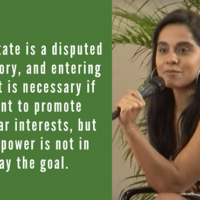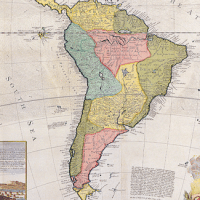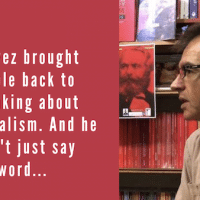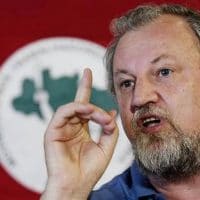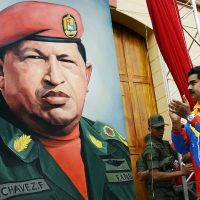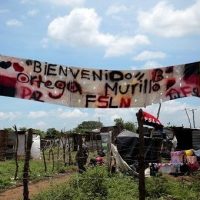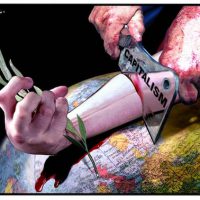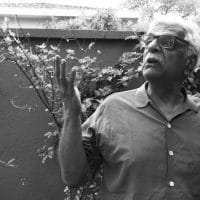-
Dossier 17: Venezuela and hybrid wars in Latin America
Dossier no. 17 reflects on the hybrid war unleashed against Venezuela. We document the repertoire of tactics, but also the motives behind them. We are interested not only in the recent attack on Venezuela, but in the similarities between this attack and others in Latin America over the past decades.
-
Building socialism from below
The state is a disputed territory, and [entering into it] is necessary if we want to promote popular interests, but state power is not in any way the goal. In any effort to build popular power, there must be synergy between the bottom and the top. The key issue here is that what is done “from above” must strengthen popular power from below.
-
U.S. imperialist domination in Latin America and Europe
The history of empires amply demonstrates that in their phase of decline they become more violent and bloodthirsty, and that their leaders tend to be coarser and more brutal. Not only their leaders, as Donald Trump clearly demonstrates. Also its environment of advisors reflects similar devolution, becoming something similar to what Harold Laski, referring to the leaders of European fascism, called “outlaw elites”.
-
The Latin American left’s setbacks: what does it all mean?
Steve Ellner and Alan Freeman talk about the Pink Tide and what came after in Venezuela and in the Latin American region.
-
The worldwide struggle against fascism: a conversation with Nestor Kohan (Part 2)
An important Latin American political theorist argues that right-wing “internationalism” requires a leftist response that also reaches beyond national boundaries.
-
Joao Pedro Stédile: “Venezuela is extremely important because it is the battle of this century”
It is a fundamental task for the class struggle that we succeed in liberating Lula so that he becomes the principal spokesman, he is the one who has the capacity to help mobilize the masses against the system and the project of the extreme right.
-
Elliott Abrams, Washington’s ‘new’ Cold Warrior, plots regime change in Caracas
The Trump administration set a 23 February deadline for Venezuelan president Nicolás Maduro to bow to U.S. demands and cede power to self-appointed “president” Juan Guaidó.
-
Peculiarities of U.S. imperialism in Latin America
Venezuela, the current target of U.S., President Donald Trump, is a case illustrating the ‘peculiarities’ of imperialist politics. We will proceed to outline the background, techniques and impact of the imperial power grab.
-
Social democracy or barbarism? Barbarism, please
Political commentators see AMLO as a bigger threat than Bolsonaro.
-
Living our lives inside a tragedy the size of the planet
After fifteen years in the cold, the International Monetary Fund (IMF) returned to Argentina this May. President Mauricio Macri promised to attract foreign direct investment and to make his country the ‘supermarket of the world’. Instead, Argentina’s economy went into a tailspin. The IMF entered with its shop-worn prescriptions, a recipe that it has effectively sold for the past four decades: structural adjustment.
-
Nicaragua’s success threatens U.S. stranglehold on Latin America
It’s imperative that President Ortega and Nicaragua be defended from covert imperialist aggression by the United States under its brand of fake ‘democracy,’ writes Lauren Smith.
-
Boldness in the Marxist thinking of Samir Amín
The great social thinker, Samir Amin, has died. The social sciences have lost three unique figures in this year. First, the Brazilian Theotonio dos Santos, who inspired many to study the world system from a radical perspective. He was followed by the Peruvian Aníbal Quijano, who posed the concept of “cultural revolution” to give the peoples of Latin America their own identity.
-
Atlas Network, the right-wing libertarians
Aram Aharonian and Álvaro Verzi Rangel, co-directors of the Observatory in Communication and Democracy (OCD) and Latin-American Centre of Strategic Analysis (CLAE), wrote a detailed analysis of the Atlas Network and its deep impacts in Latin America. We will be sharing a translated version of this article in parts, the first part is about the network itself and the later parts will address specific country cases.
-
U.S. military presence in Latin America & the Caribbean
The United States has some 800 military bases around the world, with 76 in Latin America and the Caribbean to protect its hegemonic interests in the region.
-
Colonialism 2.0 in Latin America and the Caribbean
Once the internet became the world’s central nervous system, the U.S. borders were extended across the planet.
-
On capital-imperialism: an interview with Virgínia Fontes
In her book Reflexões im-pertinentes: História e capitalismo contemporâneo published in 2005, she examined the development of capitalism and its new forms of commodification through a combination of theoretical reflection and empirical analysis. Based on the concept of expropriation, her research reflects a recovery of the critique of political economy in social theory.
-
Chavismo will be socialist or it will cease to exist
If there was something Hugo Chavez longed to build in Venezuela, it was a transition to 21st century socialism, writes Marco Teruggi.
-
“The Left is a bit stuck in what needs to be done today”
In September 2017, Tariq Ali visited our office in São Paulo for a long conversation. Here’s what he said about Chávez, Lula and the end of the “pink tide” in Latin America
-
The media’s fake news about Latin America
TIM YOUNG demonstrates how Western coverage of South America is heavily biased against the continent’s progressive leaders, movements and governments.
-
Capitalism and punishment
David Russio takes a look into the punishments (deaths) that come from capitalism. For is it really bringing balance to the destruction that it causes. That seems to be the loaded question we all know the answer to.


